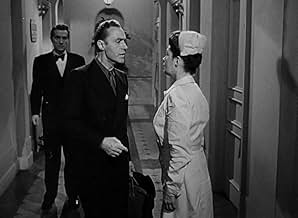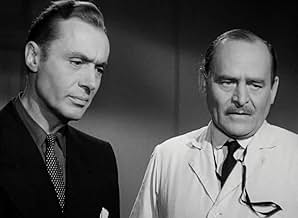NOTE IMDb
6,3/10
2 k
MA NOTE
Ajouter une intrigue dans votre langueIllegal refugees lead dark lives in pre-World War II Paris.Illegal refugees lead dark lives in pre-World War II Paris.Illegal refugees lead dark lives in pre-World War II Paris.
Richard Alexander
- Gestapo Agent
- (non crédité)
Sylvia Andrew
- Milan Charwoman
- (non crédité)
Frank Arnold
- Newsboy
- (non crédité)
Jessie Arnold
- Cashier
- (non crédité)
George Balooi
- Scheherazade's Waiter
- (non crédité)
Histoire
Le saviez-vous
- AnecdotesThe rough cut of the film ran four hours. In reducing it to two hours, several actors were cut, including Ruth Warrick. She does appear briefly in the restored 133-minute version.
- GaffesWhen Ravic takes his gun and goes to look for Haake in the streets, the first shot of him has been reversed for some reason as evidenced by the signs he passes, which are backwards.
- Citations
Joan Madou: He wanted to kill me. They always talk about it but they never do.
[laughs]
Joan Madou: You wouldn't want to kill me.
- ConnexionsFeatured in Legendy mirovogo kino: Charles Boyer
- Bandes originalesLong After Tonight
(1948) (uncredited)
Music by Rudolph Polk
Music by adapted from the Russian folk song "Prochlada"
Lyrics by Ervin Drake and Jimmy Shirl
Sung by an uncredited singer dubbing Ingrid Bergman at the Scheherazade casino
Commentaire à la une
Arch of Triumph (1948)
Wow, what a difficult movie to assess, but not a difficult one to enjoy. On the one hand, it is dripping with mood and anxiety. It is about budding love and broken hearts. There is political intrigue and and incipient Nazi invasion. And it's France, Paris, center of the end of the great century of European art and culture, from the mid 1800s to the mid 1900s.
On the other hand, it seems amorphous and vague.
Director Lewis Milestone makes this 1938 Paris gloomier than Sherlock Holmes's London--the rain, the darkness, the general lack of hope is part of the great drama lurking behind every scene. Charles Boyer is the main character, a refugee of uncertain origin, and the mysterious woman with both rich and poor friends and an equally uncertain origin is played in usual melodrama by Ingrid Bergman. They have no chemistry, for sure, but that just makes their love affair mysterious as well. In fact, the whole movie is about what we don't know, and can't know by watching.
This could be frustrating for some viewers, this lack of intention, and frankly lack of clear plot. But if you can just inhabit this world, enjoying a highly polished mise-en-scene (so polished it shows its Hollywood sound stage roots, at times, though darkly, darkly), if you can just soak it up and not worry, all will be well. It's a beautiful beautiful movie on those terms, photographer Russell Meety is doing that 1940s high contrast photography to perfection. Watch how often he shoots through windows, including the great phone booth shot (repeated ten minutes later) where the accident happens in the background.
The story here is based on a 1945 novel by German author Erich Maria Remarque, and Milestone directed the legendary "All Quiet on the Western Front" two decades earlier, also based on a Remarque novel. In both cases, there is an intensity of humanity against the larger military chaos and cruelty that seems so indifferent to them. The book here was actually published in English first as "The Arch of Triumph," and was a huge bestseller before going to a German version.
I don't think it's an accident that the pre-war angst here is an echo of "Casablanca," which by now (five years later) was already legendary. Bergman, of course, is carried over (though she had just finished filming "Notorious" for Hitchcock, if you want to follow her career). And Boyer is a better version of Henried (better as an actor). For more colorful secondary characters, you'll find the incomparable Louis Calhern (with a surprisingly effective accent) and Charles Laughton (whose accent is wobbly).
This was originally a more gut wrenching four hour film, and I think it might have made more logical sense at that length, but I can see it would have been too long by far. Watch what we have and just take it in for what it is. I enjoyed it on that level very very much.
Wow, what a difficult movie to assess, but not a difficult one to enjoy. On the one hand, it is dripping with mood and anxiety. It is about budding love and broken hearts. There is political intrigue and and incipient Nazi invasion. And it's France, Paris, center of the end of the great century of European art and culture, from the mid 1800s to the mid 1900s.
On the other hand, it seems amorphous and vague.
Director Lewis Milestone makes this 1938 Paris gloomier than Sherlock Holmes's London--the rain, the darkness, the general lack of hope is part of the great drama lurking behind every scene. Charles Boyer is the main character, a refugee of uncertain origin, and the mysterious woman with both rich and poor friends and an equally uncertain origin is played in usual melodrama by Ingrid Bergman. They have no chemistry, for sure, but that just makes their love affair mysterious as well. In fact, the whole movie is about what we don't know, and can't know by watching.
This could be frustrating for some viewers, this lack of intention, and frankly lack of clear plot. But if you can just inhabit this world, enjoying a highly polished mise-en-scene (so polished it shows its Hollywood sound stage roots, at times, though darkly, darkly), if you can just soak it up and not worry, all will be well. It's a beautiful beautiful movie on those terms, photographer Russell Meety is doing that 1940s high contrast photography to perfection. Watch how often he shoots through windows, including the great phone booth shot (repeated ten minutes later) where the accident happens in the background.
The story here is based on a 1945 novel by German author Erich Maria Remarque, and Milestone directed the legendary "All Quiet on the Western Front" two decades earlier, also based on a Remarque novel. In both cases, there is an intensity of humanity against the larger military chaos and cruelty that seems so indifferent to them. The book here was actually published in English first as "The Arch of Triumph," and was a huge bestseller before going to a German version.
I don't think it's an accident that the pre-war angst here is an echo of "Casablanca," which by now (five years later) was already legendary. Bergman, of course, is carried over (though she had just finished filming "Notorious" for Hitchcock, if you want to follow her career). And Boyer is a better version of Henried (better as an actor). For more colorful secondary characters, you'll find the incomparable Louis Calhern (with a surprisingly effective accent) and Charles Laughton (whose accent is wobbly).
This was originally a more gut wrenching four hour film, and I think it might have made more logical sense at that length, but I can see it would have been too long by far. Watch what we have and just take it in for what it is. I enjoyed it on that level very very much.
- secondtake
- 17 janv. 2011
- Permalien
Meilleurs choix
Connectez-vous pour évaluer et suivre la liste de favoris afin de recevoir des recommandations personnalisées
- How long is Arch of Triumph?Alimenté par Alexa
Détails
- Date de sortie
- Pays d’origine
- Langues
- Aussi connu sous le nom de
- Arch of Triumph
- Lieux de tournage
- Sociétés de production
- Voir plus de crédits d'entreprise sur IMDbPro
Box-office
- Budget
- 5 000 000 $US (estimé)
- Durée2 heures
- Couleur
- Rapport de forme
- 1.37 : 1
Contribuer à cette page
Suggérer une modification ou ajouter du contenu manquant

Lacune principale
By what name was Arc de triomphe (1948) officially released in India in English?
Répondre

































